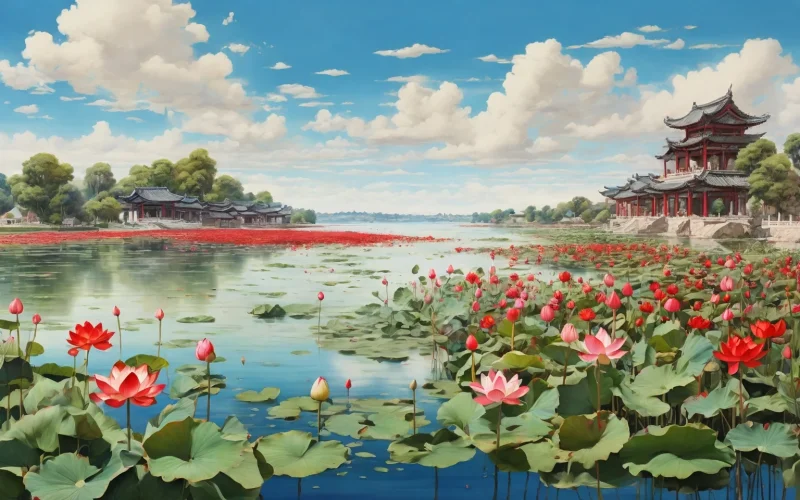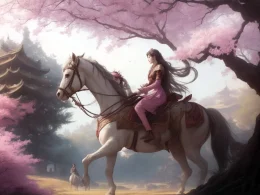After all, ’tis West Lake in June’s domain,
Scenes unmatched by seasons’ transient chain.
Lotus leaves touch the sky—boundless emerald hue,
Sunlit blooms blush crimson—a fiery view.
Original Poem
「晓出净慈寺 · 其二」
杨万里
毕竟西湖六月中,风光不与四时同。
接天莲叶无穷碧,映日荷花别样红。
Interpretation
Composed circa 1180 during a summer morning at Jingci Temple, this quatrain—the second in a series—captures Yang Wanli's parting gaze upon West Lake's lotus-filled splendor. Written while seeing off friend Lin Zifang, the poem transmutes farewell melancholy into radiant natural imagery, where botanic grandeur becomes emotional subtext.
First Couplet: "毕竟西湖六月中,风光不与四时同。"
Bìjìng Xī Hú liù yuè zhōng, fēngguāng bù yǔ sìshí tóng.
After all, this is West Lake in June—
its radiance defies all other seasons.
The emphatic "after all" (毕竟) delivers instant revelation, positioning June's lotus spectacle as nature's singular masterpiece. This declarative opening—more botanical manifesto than conventional prelude—prepares for the chromatic explosion to follow.
Second Couplet: "接天莲叶无穷碧,映日荷花别样红。"
Jiē tiān lián yè wúqióng bì, yìng rì héhuā biéyàng hóng.
Leaves stretch skyward in infinite jade,
lotus blooms ignite in unprecedented crimson.
Here, Yang's brushwork achieves sublime economy: "infinite jade" (无穷碧) and "unprecedented crimson" (别样红) compress the lake's essence into two color fields. The horizontal ("skyward") and vertical ("ignite") vectors create dynamic tension, while the implied mirror—lotus reflecting sun, lake reflecting sky—dissolves boundaries between elements.
Holistic Appreciation
Yang Wanli transforms the parting poem tradition. Where others lament separation directly, he lets landscape articulate emotion. The lotus leaves' "infinite" expanse mirrors unspoken friendship's breadth; the blooms' "unprecedented" intensity reflects moments too vivid to last. This ecological elegy hides its grief in plain sight—within summer's most exuberant display.
The poem's power lies in its dual focus: optically, it renders West Lake's June glory with Impressionist brilliance; emotionally, it encodes transience in perpetual bloom. The very vibrancy that dazzles ("ignite in crimson") becomes metaphor for life's fleeting zeniths.
Artistic Merits
- Chromographic Precision
The jade-crimson dichotomy (碧 vs. 红) achieves maximal visual impact through minimal verbal means. - Perspectival Mastery
"Skyward" (接天) and "sun-struck" (映日) angles construct a cubist landscape viewed simultaneously from multiple vantage points. - Temporal Paradox
The "unprecedented" (别样) blossoms—both eternally recurring and uniquely momentary—embody nature's cyclical yet unrepeatable beauty. - Absent Presence
The unmentioned farewell permeates every image, making Lin Zifang's departure the poem's invisible center.
Insights
Yang Wanli's genius lies in recognizing nature as emotional cipher. His lotus leaves don't merely "stretch"—they reach like lingering handshakes; the blooms don't simply "ignite"—they flare like sudden understanding before parting. This poem teaches that profound emotion often speaks through seemingly objective description.
For contemporary readers, it models how to memorialize transient connections: not through explicit mourning, but by immortalizing shared contexts. The lake's June glory becomes time capsule—a brilliance preserved to outlast human separation.
About the Poet

Yang Wanli (杨万里 1127 - 1206), a native of Jishui in Jiangxi, was a renowned poet of the Southern Song Dynasty, celebrated as one of the "Four Great Masters of the Restoration" alongside Lu You, Fan Chengda, and You Mao. He attained the jinshi degree in 1154 and rose to the position of Academician of the Baomo Pavilion. Breaking free from the constraints of the Jiangxi School of Poetry, he pioneered the lively and natural "Chengzhai Style," advocating for learning from nature and employing plain yet profound language. His poetry, often drawing inspiration from everyday life, profoundly influenced later schools of lyrical expression, particularly the Xingling (Spirit and Sensibility) School.












